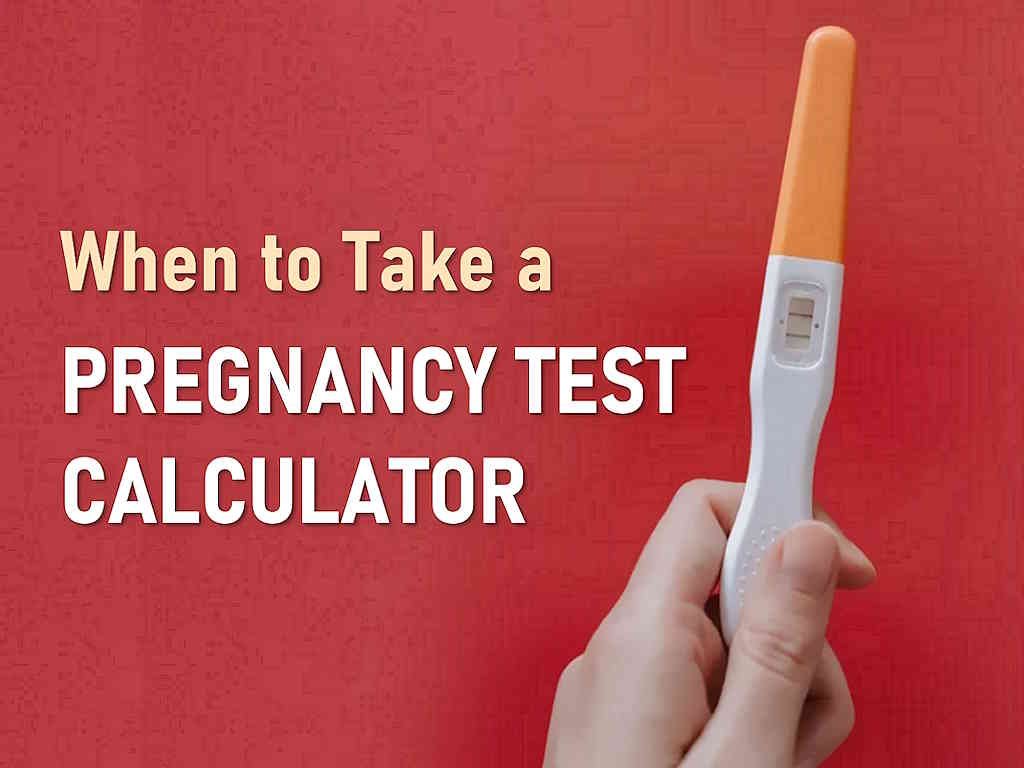When to Take a Pregnancy Test Calculator
When is the ideal time to take a pregnancy test? How soon can you test for pregnancy, and when will a positive result appear? If you’re trying to conceive, it’s natural to want answers as quickly as possible. Discover the best and earliest timing for accurate pregnancy test results.
Related Calculators
How to Use the Pregnancy Test Calculator
This calculator is straightforward and can be used by anyone unsure about the best time to take a pregnancy test. All you need is a few details:
- The date your last menstrual period began (the first day of your period).
- The average length of your menstrual cycle.
How Do Pregnancy Tests Work?
Pregnancy tests work by detecting the hormone “Human Chorionic Gonadotropin” (hCG), which is only produced after a fertilized egg implants into the uterus. Implantation usually occurs between 6 to 12 days after ovulation. Blood tests can detect hCG about 2-3 days after implantation, while urine tests typically detect it a few days later. The timing of implantation and the sensitivity of the test both play a role in when you’ll get an accurate result.
When to Take a Pregnancy Test ?
For the most accurate results, it’s best to wait until you’ve missed your period. Most home pregnancy tests are designed to detect hCG at this point, though some can provide results a few days before. Taking a test too early can result in a false negative, where the test shows a negative result even though you are pregnant.
Types of Pregnancy Tests
- Home Urine Test: This test is available over-the-counter and detects the hormone hCG in urine. It is typically accurate from the day of a missed period.
- Blood Test: Performed in a healthcare setting, this test detects hCG in the blood and can identify pregnancy as early as 7-10 days post-ovulation.
Factors Affecting Pregnancy Test Results
- Day of Ovulation: If ovulation occurs later than expected, implantation and detectable hCG levels will also be delayed.
- Timing of Implantation: Implantation can vary, happening as early as 6 days or as late as 12 days post-ovulation.
- hCG Levels: Natural variations in hCG production can affect test timing. Some women produce hCG more slowly, leading to a later positive result.
- Test Sensitivity: Pregnancy tests vary in sensitivity, with some detecting lower levels of hCG than others. Look for a sensitivity rating (in mIU/mL) on the packaging.
Types of Home Pregnancy Tests
Home pregnancy tests vary in accuracy and sensitivity, with two main types:
- Early Home Pregnancy Tests: These tests are more sensitive and can detect lower levels of hCG. They may be taken a few days before a missed period, though accuracy is generally lower at this time.
- Regular Home Pregnancy Tests: Standard pregnancy tests are typically accurate from the day of a missed period, providing more reliable results than early tests.
Purchasing Pregnancy Tests
When choosing a home pregnancy test, consider the following:
- Accuracy: Most home pregnancy tests claim 99% accuracy if used on or after the day of a missed period, provided sufficient hCG levels are present.
- Sensitivity: Test sensitivity is measured in mIU/mL, with lower values indicating a higher sensitivity to hCG. For early testing, look for tests with lower sensitivity thresholds.
Early home pregnancy tests can be used up to five days before a missed period, though the accuracy may be lower. For optimal results, it’s generally best to test after a missed period, as hCG levels rise rapidly at this time, improving test reliability. Early pregnancy tests are typically labeled as “early detection” and indicate the lowest detectable hCG levels on their packaging.
Tips for Using an At-Home Pregnancy Test
- Use your first-morning urine, which is more concentrated and contains higher levels of hCG.
- Avoid drinking excessive fluids before testing, as diluted urine can lead to inaccurate results.
- Follow the test instructions carefully, including the wait time for reading the result.
Earliest Time to Take a Pregnancy Test
If you know your ovulation date, this can help guide testing. The earliest you can take an early-detection test is typically 9-11 days post-ovulation (DPO), or about 4-5 days before your expected period. However, for the most reliable early results without sacrificing accuracy, it’s best to test between 12-13 DPO, or about 1-2 days before your expected period.
Optimal Time to Test for Highest Accuracy
The most accurate time to take a home pregnancy test, whether early or regular, is from 14-15 DPO, or from the first day of your missed period. At this point, hCG levels are typically high enough to ensure a clear result, reducing the chance of false negatives or faint positives.
Understanding Pregnancy Test Results
Most pregnancy tests indicate a positive result through two lines, a cross, or by displaying the word “pregnant.” If your result is faint, it may still indicate a positive result, as hCG levels vary between individuals. A faint line simply indicates lower levels of hCG, which may still be enough to confirm pregnancy.
Available Early-Detection Pregnancy Tests
Here are some of the popular home pregnancy test kits available in the USA.
First Response Gold Pregnancy Test
- Earliest Use: 5 days before a missed period.
- Accuracy: About 60% accurate at that time, increasing to 99% accurate the day before the expected period.
Clearblue Digital Pregnancy Test with Smart Countdown
- Earliest Use: 4 days before your missed period.
- Accuracy: 51% accuracy at that time, rising to 95% the day before your period and 99% on the day of the expected period.
First Response Early Result Pregnancy Test
- Earliest Use: 6 days before a missed period.
- Accuracy: 76% accurate at that time, with higher accuracy as the period date approaches.
Wondfo Pregnancy Test Strips
- Earliest Use: Recommended for use 1 day after missing your period, but some users report accuracy as early as 8-10 days post-ovulation.
- Accuracy: Best accuracy is 1 day after a missed period.
Accu-Clear Early Pregnancy Test
- Earliest Use: Suggested for use on the day of the missed period for best results.
- Accuracy: 99% accurate on the expected period date.
e.p.t Certainty Pregnancy Test
- Earliest Use: Recommended on the day of the missed period for best accuracy.
- Accuracy: 99% accurate when used correctly.
These tests vary in sensitivity and the timing for optimal use, so it’s essential to follow the specific instructions provided with each product for the best results.
Frequently Asked Questions (FAQs)
How early can I take a pregnancy test?
With an early-detection test, you may test as soon as 5 days before your expected period. However, for the most reliable results, testing on the day of a missed period is ideal.
What are Pregnancy Test Calculator Based on LMP ?
A pregnancy test calculator can help you estimate the best time to take a pregnancy test based on your Last Menstrual Period (LMP) and your average cycle length. For those with irregular periods, this calculator can also account for variable cycle lengths, though results may still vary depending on individual factors.
Can I take a pregnancy test before my missed period?
Yes, but early tests may not be accurate. Most tests are more reliable when taken on the first day of a missed period. Some sensitive tests can detect pregnancy a few days before, but there’s a higher chance of a false negative.
Why did I get a negative test result even though I’m pregnant?
Early testing is a common reason for a false negative. hCG levels may not yet be high enough to detect. Additionally, testing later in the day or after drinking a lot of fluids can dilute urine and affect results. Waiting a few days and testing again can often yield a positive result.
What factors can delay a positive pregnancy test?
Factors like delayed ovulation, later implantation, low hCG levels, and differences in test sensitivity can all impact when a pregnancy test will show a positive result.
How do irregular periods affect pregnancy test timing?
For those with irregular cycles, it can be challenging to determine the best time to take a pregnancy test. A pregnancy test calculator that considers ovulation and average cycle length can help, but it’s often best to wait until your longest expected cycle length has passed.
Are early-detection pregnancy tests accurate?
Early-detection tests can be accurate but are still less reliable before a missed period. According to some brands, accuracy increases the closer you are to your expected period date. Waiting a few extra days reduces the chance of a false negative.
Can certain medications affect my pregnancy test results?
Most medications, including antibiotics and birth control, do not affect pregnancy test results. However, medications that contain hCG, often used in fertility treatments, can lead to a false positive.
When is the best time to take a pregnancy test?
The most accurate time to take a pregnancy test is the day you expect your period to start. Testing before this may lead to a false negative due to low hCG levels.
How soon can I take a pregnancy test after IVF or ICSI?
After IVF or ICSI, a blood test scheduled by your clinic is the most reliable option. A home test may show a result around a week after embryo transfer, but consult your doctor to avoid a false positive due to IVF medications.
How soon will a pregnancy test show a positive result?
For naturally conceived pregnancies, a test should show positive about 14 days after ovulation. For IVF pregnancies, hCG can sometimes be detected slightly earlier, but waiting for the blood test is advised.
How accurate are home pregnancy tests?
Most home pregnancy tests are 99% accurate on the day of the expected period, but this can vary. Testing too early or after IVF treatments can lead to inaccurate results.
Will an ectopic pregnancy show up on a pregnancy test?
Yes, an ectopic pregnancy will still result in a positive pregnancy test, as it produces hCG just like a normal pregnancy.










